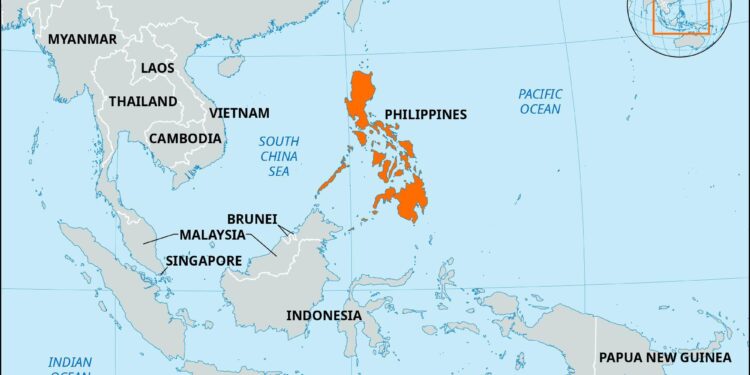In a rapidly evolving regional landscape marked by heightened tensions over Taiwan, Philippine President Ferdinand Marcos Jr. has responded emphatically to China’s interpretation of his recent comments on the self-governing island. In a statement aimed at clarifying his position, Marcos asserted that his remarks had been “misinterpreted,” amid concerns over potential diplomatic rifts in the intricately woven relationships among Asia’s key players. This development comes at a critical time when dialogue and understanding are paramount for stability in the region, prompting discussions on the implications of his statements amidst China’s assertiveness in its territorial claims. The unfolding dynamics may have significant ramifications for the Philippines’ foreign policy and its positioning in an increasingly polarized geopolitical climate.
Marcos Clarifies Stance on Taiwan Amid Rising Tensions with China
Philippine President Ferdinand Marcos Jr. has recently addressed the escalating tensions surrounding Taiwan, insisting that his remarks were mischaracterized by Chinese officials. In a press conference, Marcos emphasized that his priority lies in maintaining peace and stability in the region, expressing a commitment to diplomatic dialogue over military confrontation. He clarified that his statements, which highlighted the Philippines’ role in the regional dynamics, were intended to foster understanding rather than provoke conflict.
Marcos reiterated that the Philippines will navigate its complex relationship with both China and Taiwan with careful consideration. Key points of his statement included:
- Diplomatic Engagement: Promoting dialogue to avoid misunderstandings.
- Regional Stability: Advocating for peace in the Taiwan Strait.
- National Interest: Ensuring the Philippines’ sovereignty and territorial integrity.
| Aspect | Philippines’ Position |
|---|---|
| Dialogue with China | Priority on peaceful negotiations |
| Support for Taiwan | Call for non-aggression |
| Military Alliances | Strengthening defense ties |
Implications of Miscommunication for Philippines-China Relations
The recent diplomatic misunderstanding between the Philippines and China underscores the fragile state of their bilateral relations. President Marcos’ assertion that China misinterpreted his comments about Taiwan raises critical questions about the effectiveness of communication, especially amid rising geopolitical tensions. Key implications include:
- Escalation of Tensions: Miscommunication may exacerbate existing frictions, leading to heightened military and diplomatic posturing.
- Impact on Trade: Uncertainties in communication could stall economic agreements and trade relations, affecting both nations’ economies.
- Regional Alliances: Misinterpretations could influence the Philippines’ partnerships with other nations, potentially altering the balance of power in Southeast Asia.
Moreover, such incidents highlight the necessity for more robust channels of diplomatic dialogue. Establishing a framework for clearer communication could mitigate misunderstandings and foster greater cooperation. Consider the following strategies to enhance bilateral ties:
| Strategy | Description |
|---|---|
| Regular Bilateral Meetings | Scheduled discussions to clarify policies and intentions. |
| Joint Communication Protocols | Agreements on language and terms to prevent misinterpretation. |
| Cultural Exchange Programs | Initiatives that increase mutual understanding through people-to-people interactions. |
Strategies for Diplomatic Engagement in the Context of Regional Stability
Amidst heightened regional tensions, particularly concerning Taiwan, diplomatic rhetoric plays a pivotal role in maintaining stability. Effective engagement strategies should emphasize clarity and consistency in messaging. Misinterpretations, as evident in recent comments by Philippine President Ferdinand Marcos Jr., can easily escalate tensions. To mitigate such risks, officials may consider the following approaches:
- Regular communication channels with key stakeholders to ensure all parties are aligned on important regional issues.
- Engagement in multilateral platforms, allowing different nations to collectively discuss and address concerns while fostering cooperation.
- Crisis management protocols to be established in advance, enabling rapid response to miscommunications before they evolve into conflicts.
Additionally, understanding the nuances of diplomatic language is crucial. Governments need to prioritize cultural sensitivity and historical context in their dialogue, particularly when discussing delicate issues like Taiwan. A collaborative table that outlines points of contention and shared interests can facilitate constructive discussions:
| Issue | Interest of the Philippines | Interest of China |
|---|---|---|
| Taiwan Relations | Peaceful coexistence and regional security | Maintaining territorial integrity |
| Economic Partnerships | Increased trade and investment | Access to emerging markets |
| Military Presence | Ensuring national defense | Strengthening regional influence |
To Conclude
In conclusion, President Ferdinand Marcos Jr. of the Philippines is seeking to clarify recent remarks that were perceived by China as a potential shift in Manila’s stance on Taiwan. As regional tensions continue to mount, Marcos has emphasized the importance of open dialogue and mutual understanding between nations. By addressing the “misinterpretation” of his comments, the Philippine leader aims to reinforce the Philippines’ commitment to maintaining stability in the region and upholding its sovereignty. As diplomatic relations between the two countries are put to the test, the way forward remains critical not only for the Philippines but for the broader Asia-Pacific region. The unfolding situation highlights the complexities of geopolitical dynamics in a world where perceptions and interpretations can shape international relations.














